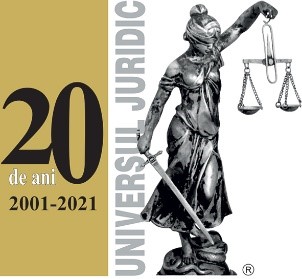Distincţia dintre acţiunea pauliană şi acţiunea în nulitate pentru cauză ilicită
valeriu.stoica[at]drept.unibuc.ro
Cuvinte cheie:
Paulian action, action for nullity for illicit cause, inexistence of the right of option, unenforceability, damageRezumat
The action for nullity for illicit cause was filed for sanctioning the follow up of an illicit purpose by the party/parties upon conclusion of the legal deed. The Paulian (revocative) action was also filed for sanctioning the follow up of an illicit purpose by either party or by both parties upon conclusion of a legal deed, and the respective purpose shall consist in defrauding the creditors’ interests to a debtor. Therefore, it is noticed that both actions have similar grounds, namely the sanction of the illicit purpose followed up by concluding a legal deed; moreover, in the case of the Paulian action, the creditor’s material damage is also sanctioned, as a result of conclusion of the fraudulent legal deed. The action for nullity is not conditional upon the existence of a material damage. Moreover, the confusion between the two types of actions was kept as well, by those authors who qualified the Paulian action as an action in the unenforceability of the legal deed against third parties (respectively as a plea of the enforceability of the legal deed against third parties).
Apparently, such a confusion has no grounds in the regulation which the applicable Civil code gives to the Paulian action, since art. 1.562 para. (1) of the Civil Code indicates that “the creditor may request that the legal deeds concluded by the debtor should be declared as unenforceable in the fraud of its rights”. Nevertheless, even this regulation keeps the source of the confusion between the Paulian action and the action for nullity by the very name of the 3rd Section of Chapter III, Title V, Book V of the Civil Code: Revocative action. The contradiction between the title of this section and the content of art. 1.562 para. (1) of the Civil Code is obvious.
That is why it is necessary to clarify the distinction between the Paulian action and the action for nullity for illicit cause, indicating from the very beginning that these two phrases do not refer to the concept of action in the procedural sense, but to the material right to action. In other words, the clarification of this distinction actually means the clarification of the distinction between the material right to Paulian action and the material right to the action for nullity for illicit cause. On this basis, it can be understood why the creditor’s option between the two material rights to action is inadmissible and the consequences of this solutions shall be highlighted. These ideas shall be applied in a particular case, respectively on the assumption of an action by which the creditor invokes the fraud of its interests by concluding the articles of incorporation of a company with legal personality by its debtor.
Publicat
Versiuni
- 24-04-2023 (2)
- 13-09-2022 (1)









